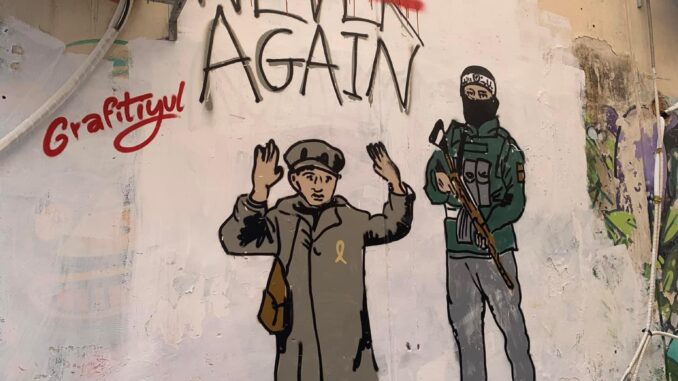
By: Jonathan Feldstein
I didn’t expect today would be such an emotional roller coaster, nor to take time writing about it. For decades, Israel and the Jewish people have observed Yom HaShoah, Holocaust Memorial Day, in solemn remembrance of the six million Jews murdered during the Holocaust. In recent years it’s become much more common for Christians to join these commemorations, either with Jewish communities where they live, on their own, or by through Israel’s nationwide observance.
In no year since the Holocaust have the Jewish people felt so hopeless and, in many cases, standing alone. In no year since the Holocaust has Israel been at war with an existential enemy rooted in extremist Islam, while observing this solemn day. In no year since the Holocaust have the Jewish people felt so physically threatened around the world, and on campuses of what used to be elite academic institutions that have now become incubators of Jew-hatred.
Holocaust Memorial Day in Israel is marked by dozens of public ceremonies along with several national ones broadcast nationally. There are thousands of memorial events in schools, community centers, synagogues, and private homes. TV and radio programming pivots almost entirely about the stories of survivors. At 10:00 am a siren is sounded for two minutes, all over the country. People stop what they are doing, even get out of cars and buses, standing in silent attention and prayer. This is what it looks and sounds like in the Judean mountains south of Jerusalem. In cities it’s even more vivid.

The day is not over and yet it’s been an emotional roller coaster. I know that dozens of my relatives were murdered, some of whose pictures we have and stories we know. It’s personal. Never in their abruptly shortened lives could they imagine that several decades since they were gassed and shot that their relatives would be living in the reborn State of Israel, where Jewish sovereignty has been restored after nearly 2000 years of exile. They knew what we live, and that Jew-haters worldwide ignore, that rather than being shouted at to “go back to Poland,” this is the place where we belong.
It was surreal that while watching the emotional story of one of Israel’s retired Supreme Court justices recounting his survival, interrupted by breaking news reports of three soldiers who were killed when terrorists in Gaza attacked the main “Kerem Shalom” crossing into Gaza through which hundreds of truckloads of humanitarian supplies enter Gaza daily. The soldiers killed were guarding the crossing and the humanitarian convoys so Gazans could have food, medical supplies, and more.
It’s true that six million Jews were murdered in the Holocaust because the world was largely indifferent, and we did not have a state or army to protect ourselves. It’s still true that evil Islamic terrorists want to kill the rest of us. Today, we have an army to defend ourselves, but the price is high.
The world doesn’t seem to care so much about dead Jews whether gassed in Poland, incinerated in Israel, or guarding humanitarian supplies, as long as we keep sending humanitarian aid to the Gazans no matter the cost, or how it emboldens our enemies. Dead Jews are only breaking news in Israel where they are our sons, daughters, mothers, fathers, neighbors, co-workers, and teachers.
Even if we’re sitting anticipating it, the two-minute siren is always piercing. Shocking. Most years, I have stood silently, thinking of my great grandparents and their children, grandchildren, and extended families and entire communities which were purged and where not a living Jew remains. I try to imagine how helpless they were, younger then than I am now, and unable to protect their family. I try to imagine myself in their shoes. The very thought is painful.
But this year, it was “easier” to imagine what they must have felt in August 1942. It’s been seven months since the inhuman Hamas massacre in which 1200 were murdered, raped, beheaded, incinerated alive, with 133 hostages still in captivity by Hamas in Gaza, with dozens of rockets and drones being fired at us daily by Hezbollah, with Iran launching an unprecedented attack on Israel just weeks ago, with western cities and campuses literally and figuratively in flames, and Jews threatened in more places by more people than any time since 1945. Some 270 soldiers have been killed, thousands injured, and countless families whose loved ones have been killed, are hostages, or are recovering from injury, both physical and psychological. The trauma is real and deep, and marking a time and the victims of when we had no allies, when we were helpless, the trauma today is exacerbated.
No, we’re not helpless. We have a State and an army, and we do have allies, if not actually reliable countries that stand with us morally and unconditionally, at least tens of millions of Christians across the globe who do. Despite the recent horrors, grief, trauma, and more, we remain resilient. Unlike our enemies who want to destroy us, we are still building the country whose 76th year of independence we will celebrate next week.
A friend attended one of the Holocaust Memorial Day official state ceremonies and shared how she did so with trepidation. She was afraid it would just add to the trauma compounded since October 7. But instead reported that she left encouraged, strengthened. One of the survivors who spoke said, “Don’t despair, never give up hope,” as survivors demonstrate by their very existence. One survivor went on to serve in the IDF, then was taken captive by the Syrians. Yet there he was, surviving a genocide and captivity by an Arab enemy.
Honestly, it’s easy to get lost in the loss, in the grief, in the trauma, praying for hostages to be released, and for the war to end but that our enemies should be defeated. But even on a day like today, we have abundant reasons for hope, for believing in a better tomorrow.
